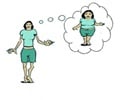Glossary
Binges: Episodes of uncontrolled excessive eating.Anorexia: An Eating Disorder commonly found to affect adolescent girls and women.
Vomiting: The ejection of contents of the stomach through the mouth; or, the material itself.
Laxatives: A drug that stimulates bowel movements.
Syndrome: A group of symptoms that characterise a specific condition. A set of signs or a series of events occurring together that makes up a disease or health problem.
Depression: Mental state of low mood commonly associated with feelings of sadness, emptiness, despair or loss of interest in life or worldly matters.
Obese: Obesity occurs when a person has too much body fat. Obesity is not the same as being overweight; a person is considered obese when they weigh 20% or more of the maximum desirable weight for their height.
Binge Eating: A Condition that involves eating a large amount of food within a short period of time. Seen commonly in Bulimia Nervosa.
Inflammation: A response of redness, swelling, pain, and a feeling of heat in certain areas, which is meant to protect tissues, affected by injury or disease.
Heartburn: Pain due to regurgitation (reflux) of juices from the stomach into the oesophagus; pyrosis.
Hirsuitism: Presence of excessive hair on the body or the face.
Psychotherapy: The therapy that involves the patient talking about their mental and emotional disorders to a psychiatrist, psychologist or licensed counsellor for treatment.
Hormonal: Effects particularly caused by hormones.
Infertility: The inability to produce children.
Scalp: Skin over the head on which the hair grows.
Diuretic: A substance or drug that causes increased passing of urine.












